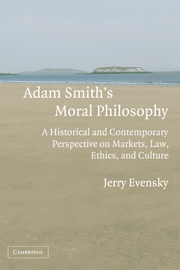 Adam Smith's Moral Philosophy
Adam Smith's Moral Philosophy Book contents
- Frontmatter
- Contents
- Preface
- Adam Smith's Moral Philosophy
- PART ONE ON ADAM SMITH'S MORAL PHILOSOPHICAL VISION
- PART TWO ON THE PLACE OF THE WEALTH OF NATIONS IN ADAM SMITH'S MORAL PHILOSOPHICAL VISION
- 5 On the Progress of Opulence, Setting the Scene in Book I of The Wealth of Nations
- 6 The Role of Capital in the Progress of Opulence: The Analysis of Book II of The Wealth of Nations
- 7 An Unnatural Path to Natural Progress: Smith Represents the Power of His Principles in Book III of The Wealth of Nations
- 8 Smith on the Mercantile System and the Evolution of His Voice: Book IV of The Wealth of Nations and Part VI of The Theory of Moral Sentiments
- 9 On the Role of Government: Book V of The Wealth of Nations
- PART THREE ON ADAM SMITH'S MORAL PHILOSOPHICAL VISION AND THE MODERN DISCOURSE
- Epilogue: On the Human Prospect
- References
- Index
5 - On the Progress of Opulence, Setting the Scene in Book I of The Wealth of Nations
Published online by Cambridge University Press: 11 November 2009
- Frontmatter
- Contents
- Preface
- Adam Smith's Moral Philosophy
- PART ONE ON ADAM SMITH'S MORAL PHILOSOPHICAL VISION
- PART TWO ON THE PLACE OF THE WEALTH OF NATIONS IN ADAM SMITH'S MORAL PHILOSOPHICAL VISION
- 5 On the Progress of Opulence, Setting the Scene in Book I of The Wealth of Nations
- 6 The Role of Capital in the Progress of Opulence: The Analysis of Book II of The Wealth of Nations
- 7 An Unnatural Path to Natural Progress: Smith Represents the Power of His Principles in Book III of The Wealth of Nations
- 8 Smith on the Mercantile System and the Evolution of His Voice: Book IV of The Wealth of Nations and Part VI of The Theory of Moral Sentiments
- 9 On the Role of Government: Book V of The Wealth of Nations
- PART THREE ON ADAM SMITH'S MORAL PHILOSOPHICAL VISION AND THE MODERN DISCOURSE
- Epilogue: On the Human Prospect
- References
- Index
Summary
MOVING INTO THE THIRD DIMENSION
As the name of the work implies, Smith turns his focus to an analysis of the progress of opulence in his Inquiry into the Nature and Causes of the Wealth of Nations. I begin my inquiry into Smith's Inquiry where he began, in WN Book I, where he sets the scene for his analysis of the progress of opulence by
laying out the assumptions (e.g., the propensity to truck, barter, and exchange) he brings to the analysis,
explaining the principles (e.g., the division of labor) that guide that analysis,
defining the terms essential for presenting that analysis (e.g., wages, rent, profit, interest),
describing the characteristics of individual markets in an exchange system through partial analysis, contrasting the natural and unnatural cases,
anticipating some of the themes that will be developed as he moves from a partial to a general, dynamic analysis of an exchange system and the progress of opulence (the efficiency of competition, the central role of accumulation, the essential role of laws and institutions), and
describing the process through which the commercial stage emerges in the course of the progress of opulence.
THE FOUNDATION OF THE PROGRESS OF OPULENCE: THE DIVISION OF LABOR
The Division of Labor and Productivity
Smith believes the key to the progress of opulence is increasing the productivity of labor, so what better place to start an Inquiry into the Nature and Causes of the Wealth of Nations than with the words:
The greatest improvement in the productive powers of labour, and the greater part of the skill, dexterity, and judgment with which it is any where directed, or applied, seem to have been the effects of the division of labor.
(WN, 13)- Type
- Chapter
- Information
- Adam Smith's Moral PhilosophyA Historical and Contemporary Perspective on Markets, Law, Ethics, and Culture, pp. 111 - 137Publisher: Cambridge University PressPrint publication year: 2005
